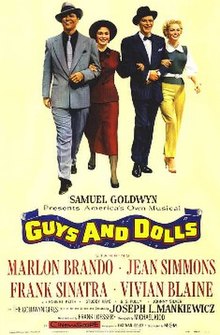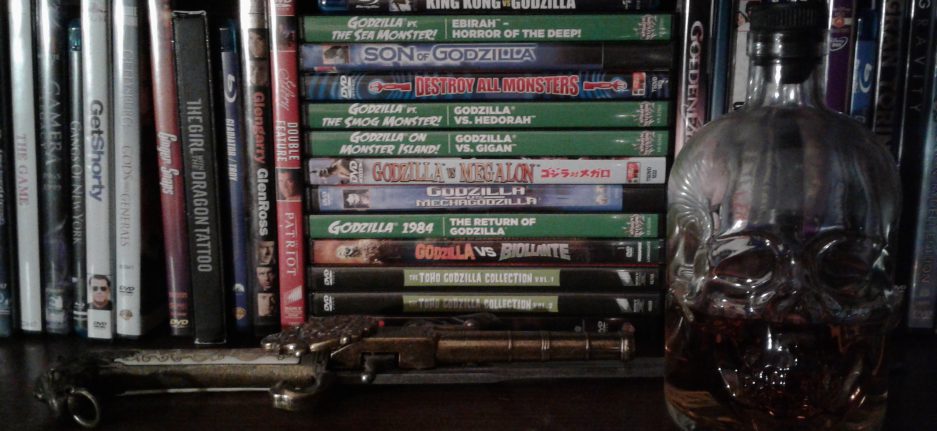I can’t help it: When I think of Guys and Dolls, I think only of Mark Hamill as Nathan Detroit, pepper steak as the entree, and “Luke, Be a Jedi Tonight”. The Simpsons ruined me, I guess. But that doesn’t mean I won’t try to remedy that situation with the real McCoy, urged on by our eponymous benefactrix.

Guys and Dolls, for those similarly uninitiated as myself, tells the dual story of Nathan Detroit, the organizer for a popular floating craps game, and Sky Masterson, an inveterate gambler. In order to drum up the seed money for the next game, Detroit bets Masterson that he can’t seduce local Salvation Army Sgt. Sarah Brown and take her to Havana with him; Masterson accepts and goes about his way, while Detroit deals with his issues with logistics and his own flame, showgirl Adelaide, who’s more keen on marriage than he is (they’ve been engaged for fourteen years, Beyonce better not find out). Insert music-laden shenanigans as the two guys figure out how to deal with their respective lovelorn situations.
Now, like I said, my primary source of inspiration for this show is a bevy of parodies and whatnot over the intervening decades. As such, I figured this was a show about Nathan Detroit; on the contrary, Detroit’s plot is more of a B-plot, taking the backseat to Masterson’s slightly problematic wooing of Sgt. Brown. This came as quite the surprise to me, especially considering the cast: Why would legendary showman Frank Sinatra be given the relative sidekick role against Marlon Brando? I mean, Brando can’t sing. We’re talking Emma Watson in Beauty and the Beast and Ryan Gosling in La La Land levels of inability here. In fact, despite working diligently with vocal coaches (and being snubbed for help by Sinatra, who was jealous of his co-star’s larger role), Brando’s scenes were cobbled together in editing, with several takes Frankensteined into one barely passable recording. He himself thought he sounded like “the mating call of a yak”. This is exceedingly glaring throughout, but nowhere more so than in (arguably) the most famous song in the film, “Luck Be a Lady”, which is known for being a staple of Sinatra’s stage shows (so much so that I was shocked to see Brando beginning the song), and which suffers at Brando’s incapable vocal chords. Meanwhile, Sinatra does extremely well in his role, lending all of the coolness and panache one would expect from the legend, even if he often clashed with songwriter Frank Loesser and many of his co-stars.
That said, the rest of the cast performs admirably here. Jean Simmons brings the heat as Sgt. Brown, both in her earlier prim and later “carefree” (not sure what other word to use here, honestly) incarnations, and does much better than I think Marilyn Monroe would have done had she gotten the role as desired (we can thank some behind-the-scenes shenanigoats for her rebuff). There are some issues with her character’s writing, but that bleeds into a bigger concern with the film’s messaging, which we’ll get into more in a bit. Viviane Blaine (as Adelaide), Stubby Kaye, Johnny Silver, and B.S. Pully (all as hoods) come over from the original Broadway cast and hold their own rather well alongside the Hollywood crew. Robert Keith is a hoot as the overly-serious police Lt. Brannigan, who can never quite catch a break, despite his constantly hanging around Detroit and his crew.
On the other side of the camera, writer/director Joseph Mankiewicz helms the tumultuous project fairly well, though the script left a bit to be desired. Sure, there are some punchy lines in there (examples: “It’s a holiday in Denmark”, “Drop dead, Joey”, and “Tell the people what a bum you are”), and the back-and-forth between Detroit and Masterson is great, but much of the dialogue feels incredibly artificial and stilted. Admittedly, this was Mankiewicz’s way of homaging the style of Damn Runyon, the writer on whose stories the show and film are both based, but it just doesn’t work. The lack of contractions and odd, seemingly fake veneer of formality occasionally comes across as a form of puffery by the hoods, but this only works in jokes and when sniding at the police, not amongst themselves at all times. Hell, Mankiewicz penned the absolutely sharp and hilarious The Philadelphia Story, so I know he was capable of better. Plus, Mankiewicz used the term “Sister Sarah” so many times that I quickly took to joking at the screen that she looked as though she needed a pair of mules. Moreover, the script has some serious messaging problems. I understand Sarah is meant to be seen as surreptitiously desiring an escape from her oppressively prim and proper lifestyle, as evinced by her nervous tick of loosening one of her buttons, but this trait is only ever shown in the presence of other characters – especially Masterson – and never really on her own. When she begins to fall for Masterson in Havana, one can only side with Sky when he remarks how easy it is to win with “loaded dice”, referring to her inebriated condition, as there’s no other clear indication that she truly wants to break from her current situation back home. There seems to be a thread about changing your lover being bad in the Detroit-Adelaide plotline, but this doesn’t really hold true in the Masterson-Brown story, making me wonder what I’m supposed to think here. In either case, the messaging is both muddled and ineffective, regardless of the target. Similarly, I have no idea how this version of the Salvation Army is supposed to work. Sarah is seen as something of a failure for not getting butts in the mission’s seats, but that implies the mission is out for some sort of profiting, rather than actual soul-saving. Given Brother Arvide’s constant buying into cons (also, is Arvide an actual name?) and Sarah’s eventual commandment-breaking in order to cover for the hoods, I question everyone’s devotion to The Cause, honestly. Now, that may have been part of a satirical jab at holier-than-thou organizations and their members/followers, but, again, this is just an assumption of mine, ’cause the script’s messaging is so muddy and noncommittal.
Meanwhile, the production design from Oliver Smith and the art direction of Joseph Wright are both stellar here (and both garnered Oscar nods), bringing a nicely stylized version of Broadway to the big screen. Harry Stradling’s cinematography (also Oscar-nominated) is similarly on point here, making full use of CinemaScope’s broad “dollar bill proportions”, as Mankiewicz derided. Michael Kidd comes over from the stage version to ply his trade at choreography, and he absolutely kills it. The bookending pantomime bits (alright, is it actually considered pantomime? I mean, there’s music involved, and it’s more semi-interpretive dance than just acting things out, but I’m admittedly out of my vocabulary’s depth here) are nicely effective and evocative (my personal favorite bit is the double, wait, triple watch steal), and the full-on ballet approach to the “Luck Be a Lady” number was quite the sight, winning over even the initially skeptical Mankiewicz.
Speaking of the musical numbers, I have to say I was mostly unimpressed. Now, don’t get me wrong, the staging and choreography are great, as I said, but the songs themselves just did nothing for me. For example, “The Oldest Established” has some stellar harmonies and nicely extravagant bits, but the song itself feels flat, lifeless without the surrounding baubles. “Fugue for Tinhorns” tries to make use of the titular form’s overlapping and repeating vocal parts, but it sounds too cluttered and clumsy to actually work. I think the most successful number is “Sue Me”, whose dueling parts between Detroit and Adelaide fit rather well together, working as perfect foils for each other. I know “Luck Be a Lady” and “Sit Down, You’re Rockin’ the Boat” are considered classics (I know my parents love the latter), but they just didn’t work for me. I’m also glad that “A Bushel and a Peck” was one of the five songs from the Broadway show to be cut out of the film adaptation, ’cause I downright loathe that song. Dunno why, it just rubs me very much the wrong way. Meanwhile, I welcomed the addition of “Adelaide”, one of three songs Loesser wrote specifically for the film, since it gave me more Sinatra.
Overall, I’m kinda conflicted on this one. On the one hand, the songs didn’t get the job done for me, Brando’s singing is criminal, and the messaging is all over the place (if there’s even any real messaging to be found); on the other, the production design and choreography are top-notch, Sinatra helps to balance Brando’s deficiencies (at least in the singing department, otherwise Brando owned), and there was a genuine feeling of fun when the film wrapped. I guess that last part is what truly matters, as I did generally enjoy myself while watching the film. I just can’t extol it or anything.
That being said, I’ve heard there is a remake in the works, with Joseph Gordon-Levitt as Nathan Detroit and Channing Tatum as Sky Masterson. If nothing else, this sounds likee something that can make the 1955 version look like a damn masterpiece. I’d shake my head, but I can’t say as I’m completely surprised. Just disappointed.
